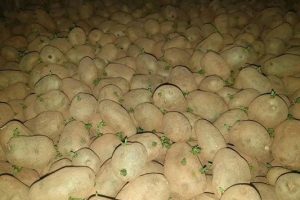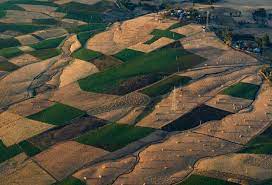
Agriculture in Ethiopia has unambiguously constituted the vast majority of economic share run by almost 80% of the rural community. It has a crucial role in boosting the economy of the country amid notably recognized challenges, which can be tackled by providing capacity building and training opportunities to the farming community thereby flourishing sustainable agriculture development.
Keeping this in mind The Ethiopian Herald interviewed Jafar Awol, an agro economist graduated from Haramaya University, to have professional view on the ways how to make the agriculture sector much more lucrative.
He said, “Yes, getting the farming community trained has played a paramount role in making the farmers equipped with skills and competencies for crop production and protection to raise their household income and improve their living standards. The sector is under increasing pressure to bridge a growing concern for economic deprivation. Agricultural productivity has to be well embarked on. The capacity of all extension workers, farmers, farming systems and even the environment, is the main issue to be focused on.”
“This means that what matters for agricultural development and achieving better productivity is the capability of people to be effective and productive economic agents. It is here that capacity building comes in. Therefore, building and strengthening organizational and institutional capacity is seen as the heart of development practice,” she said.
Human capacity building is core to efficient food production as well as rural development, especially for Ethiopia and other developing countries. Solving the problem of food security needs a forceful infusion of developed human resources; otherwise food production will be hindered. Extension professionals are increasingly required to have well developed technical skills across the board. The importance of capacity building to rural development and agricultural extension, capacity building methods for agricultural extension workers, are indeed quite important, he added.
True, he said the ecological, social, and educational, aesthetic, and local economic development attributes, tourism, food services etc. that at times require the development of cultured collective methods in communities. The farmer-extension relationship is central to increased capacity to deal with complex farming systems. Here, extension is required to work with other disciplines. Knowledge for improving farm and industry performance and environmental management does not reside in any single discipline, it resides in many disciplines and improving farm and advisory practices relies on suitable connections existing between/among disciplines. Besides, multidisciplinary approaches in agricultural capacity building often end up with lucrative avenues for a better production and productivity.
According to Jafar, extension can play a key mediating role to increase the capacity of all disciplines via supporting clarification of the orientation and purpose for learning together, facilitating multidisciplinary teams in selecting rules and patterns of behavior that help decision making and action in real time and designing effective communication cycles for multidisciplinary teams to develop and retain new repertoires for managing complexity. Extension therefore plays a significant role in the outcomes of multidisciplinary work and focusing on these areas to build capacity of the profession to work in this domain is also essential for increasingly complex farm systems situations.
That is why it is said that he said building the capacity of rural extension experts is central to making extra services effective in helping poor farmers. With a view to facilitating farmer learning and decision making regarding changes to farming systems, trying out of new technology and overcoming problems such as food security, poverty reduction, environmental management and marketing of products is well emphasized.
“In agriculture, especially in livestock activities, extension staffs work closely with farmers in the fields of animal feed, animal health and animal marketing. Capacity building opportunities should focus on young people who are not burdened with administrative or other duties and have more time to drive developments from the bottom up. Hence, capacity building methods may include conferences, workshops, consultations, study tours, participatory research and extension, on-the job training, demonstration plots, coaching and mentoring,” he underlined.
As to Jafar, providing the farming community with formal and informal training, on-the-job training, workshop/meeting, seminars, among others, are the main methods to build the capacity of extension staff to guarantee a good mix of theory and practice. The main sources of information that capacity builders use to support capacity building are training, international NGO project material, general text books, workshops, meetings, exposure visits, project/NGO documents, national networks, state/national sources, own research, on-the job learning, using Internet and other e.g. many sources, friends, facilitators, advisers and consultants.
It is well confirmed that there are four main tools for the development of capacities; these are information dissemination, training, facilitation and mentoring, networking and feedback to promote learning from experience. Training is often about the need for staff to be competent in one or more areas, including program management, proposal writing, among others, he added.
The learning-by doing approach has also been an important part of education to develop capacity and insights in a wide range of settings. It is one of the most commonly quoted processes through which partners’ capacities are understood to develop, and it is a good way for people to learn. Individuals, groups, and some organizations can learn- by-doing. Learning-by doing or experiential learning is at the heart of capacity development. New knowledge is quickly applied to the benefit of individual and organizational goals, he underlined.
According to Jafar, mentoring is also an important method for capacity building in extension. The needs of farmers are constantly changing with time and farmers’ socio-economic attributes. The implication of this is that extension needs to periodically upgrade in knowledge, skills and attitudes in order to keep pace with the emerging challenges and dynamics of extension work. Capacity building is essential in ensuring that the initial extension job training is provided as well as ensuring coping to the job changes and the varied needs of the clients.
Obviously, knowledge for improving farm and industry performance and environmental management does not reside in any single discipline as it has been intertwined with a multitude of disciplines, he opined.
“Capacity building emphasizes the need for enhancing knowledge, skills, and resources in order to improve productivity, sustainability, and resilience in agricultural systems. Capacity building in agriculture is a critical component of sustainable development, indeed! It enhances the capabilities of farmers and other stakeholders to adopt new technologies and practices improve their productivity and income, build resilience, promote innovation, and enhance food security.”
He said, “Yes, capacity building involves the development of technical and entrepreneurial skills and knowledge through a range of strategies such as farmer field schools, extension services, collaborative learning, ICTs, and public-private partnerships. Its objective in Ethiopian agriculture is to enhance the knowledge, skills, and resources of individuals, organizations, and communities involved in the agricultural sector. It definitely targets at improving the overall productivity, sustainability, and profitability of agriculture while empowering farmers and stakeholders to adapt to changing conditions and seize opportunities.”
According to Jafar, the main purpose of capacity building in agriculture in the country focuses on enhancing agricultural knowledge and skills, promoting sustainable agricultural practices thereby providing farmers with access to relevant and up-to-date information on best agricultural practices, modern technologies, crop management, soil health, water management, pest control, and post-harvest management as well as enhancing their knowledge and skills, farmers can make informed decisions, adapt improved practices, and achieve higher productivity and profitability.
Besides, he stated the system focuses on strengthening agricultural extension services to ensure effective dissemination of knowledge and technology transfer to farmers. It also aims at enhancing the capacity of extension workers to provide practical and timely advice to farmers, improve their communication and training skills, and enables them to act as facilitators between researchers, policymakers, and farmers.
Capacity building also focuses on empowering women farmers, enhancing their skills, and promoting their participation in agricultural value chains via harnessing digital technologies though there are weaknesses and noticeable gaps in this regard, he remarked.
In sum, capacity building is of great significance in various contexts, such as organizations, communities, and nations. It refers to the process of enhancing the knowledge, skills, abilities, and resources of individuals, groups, or systems to improve their performance, effectiveness, and sustainability. True, it empowers individuals and communities by providing them with the skills and knowledge they need to take control of their lives, make informed decisions, and participate actively in societal matters thereby coming up with meaningful changes.
BY MENGESHA AMARE
THE ETHIOPIAN HERALD TUESDAY 11 FEBRUARY





